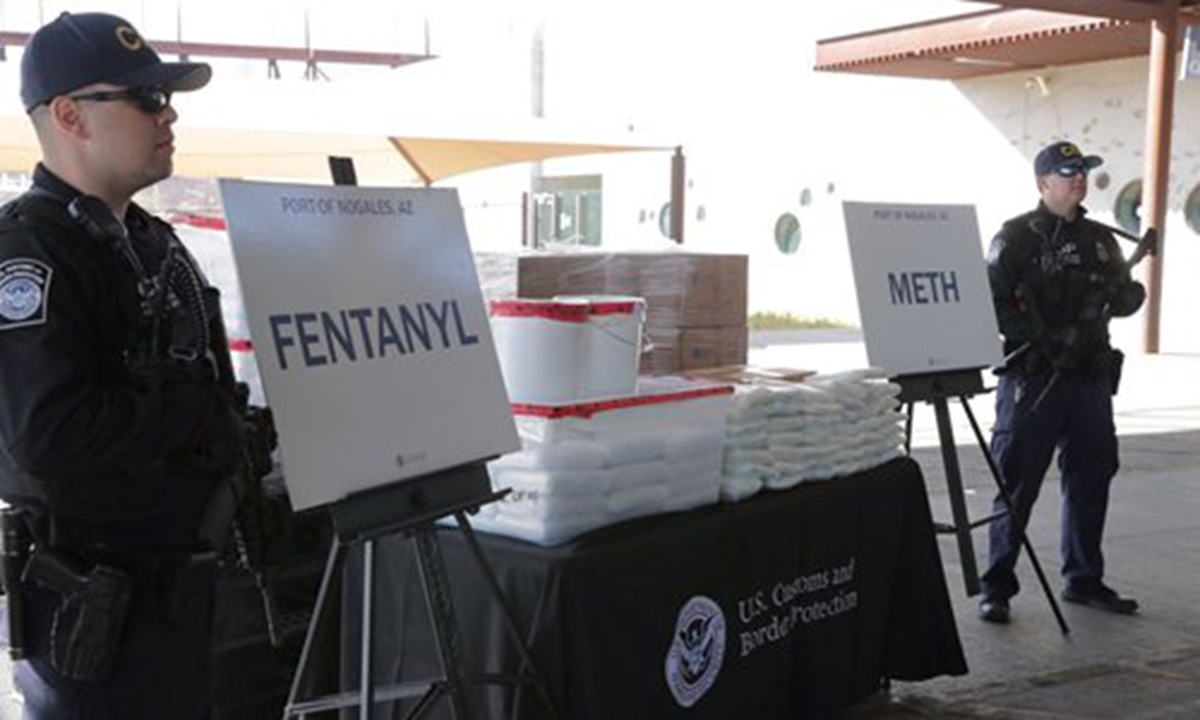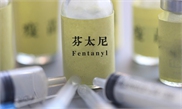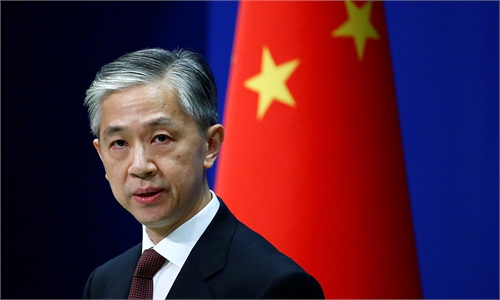
Packets of fentanyl mostly in powder form and methamphetamine, which US Customs and Border Protection say they seized from a truck crossing into Arizona from Mexico, is on display during a news conference at the Port of Nogales, Arizona, US on January 31 2019. Photo: VCG
US President Joe Biden on Wednesday signed two new executive orders imposing sanctions on 25 entities and individuals allegedly involved in drug trafficking, among which four Chinese chemical companies and one Chinese citizen appeared on the sanction list for supplying chemicals used to make fentanyl.The move has been seen as a deliberate expression of US dissatisfaction toward China's handling and regulation of the production of opioids. But rather than passing the buck to China or any other country, the US needs a more effective "prescription" to prevent fentanyl abuse.
With drug addiction involving a synthetic opioid known as fentanyl becoming one of the fast-growing causes of death in the US, there has been an ongoing misconception that the US thinks its fentanyl abuse crisis is a result of Chinese companies producing or selling the drug. It is not uncommon to see American politicians and media outlets accusing China of selling fentanyl or precursor chemicals that end up on US shores.
With an entrenched bias against China, the US is used to blaming Beijing for almost everything. And the fentanyl issue is no exception. Yet, it should be clarified that the US fentanyl abuse crisis does not originate from China, and is actually a social problem in the US. It is no secret that some American pharmaceutical companies put their own economic interests above public health by actively encouraging people to use prescription fentanyl a few years ago, leading to the quick spread of the fentanyl addiction.
The Chinese government has always kept narcotics or synthetic opioid under strict control. Since May 1, 2019, China added all fentanyl-related analogues to the country's list of controlled drugs, with 25 fentanyl analogues and two precursors on the list, more than the 21 analogs on the United Nations' list. And Chinese authorities have always been cooperative in working with the US to crackdown on fentanyl trafficking.
One of China's institutional strengths in drug control is its strict system from top to bottom, which is why it is rare for people to get access to drugs from medical channels in China.
By comparison, as the country with the most serious fentanyl abuse and the largest production of fentanyl-related analogues in the world, the US has yet to officially classify fentanyl-related analogues as controlled drugs.
The stark contrast between China and the US over the regulation of fentanyl points to the real reason why a rising number of Americans are dying from drug overdoses than ever before. More than 100,000 overdose deaths were reported between April 2020 and April 2021, up 28.5 percent from the previous 12 months, according to data from the US Centers for Disease Control and Prevention.
With 5 percent of the global population, the US consumes about 80 percent of the world's opioids. Isn't it obvious where the roots of the US fentanyl abuse crisis lies? It is a total governance failure of the US government, a result of the irresponsible indulgence of the drug abuse by the federal and state governments. If something like this happened in China, officials would have been held to account layer by layer.
If the US continues to point fingers at others over the fentanyl crisis instead of recognizing its own shortcomings, it will only encounter a dead-end when it comes to addressing its drug issue.
What the US needs to do now is to impose strict control to curb illegal drugs, instead of wielding the threat of sanctions around for no end.
If the US continues its addiction to sanctions, other countries will become increasingly clear that this is a tool being use to hide a failure of domestic governance.


